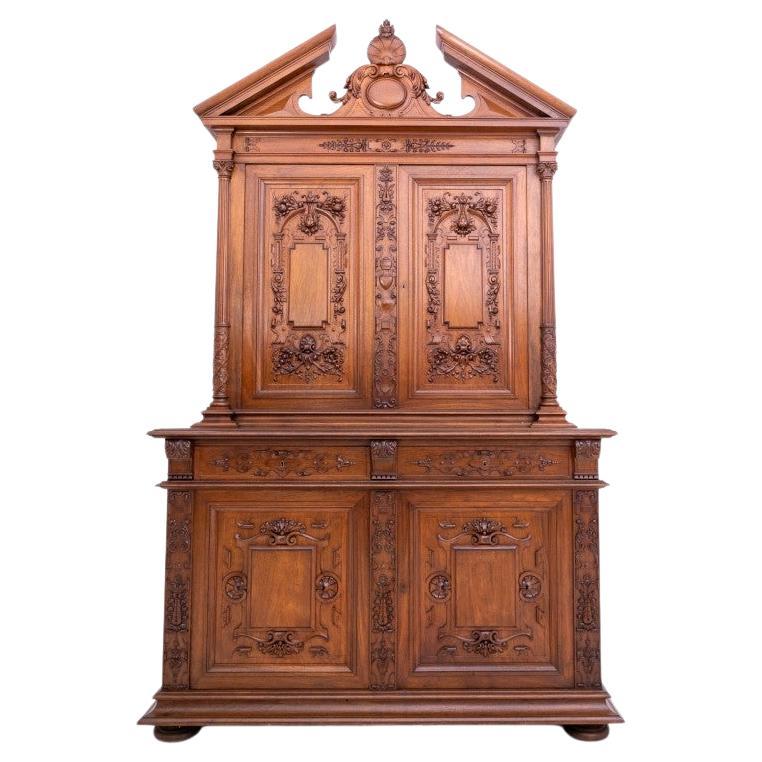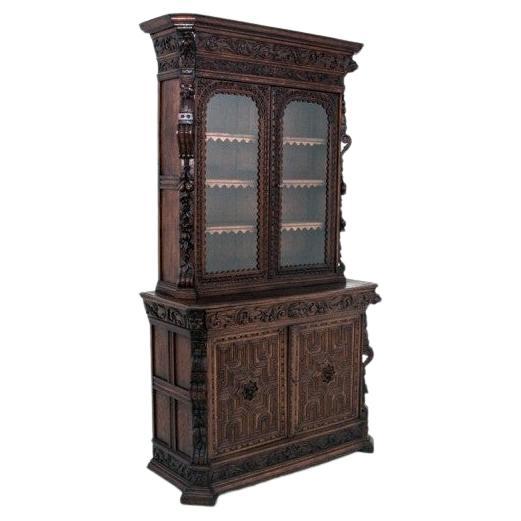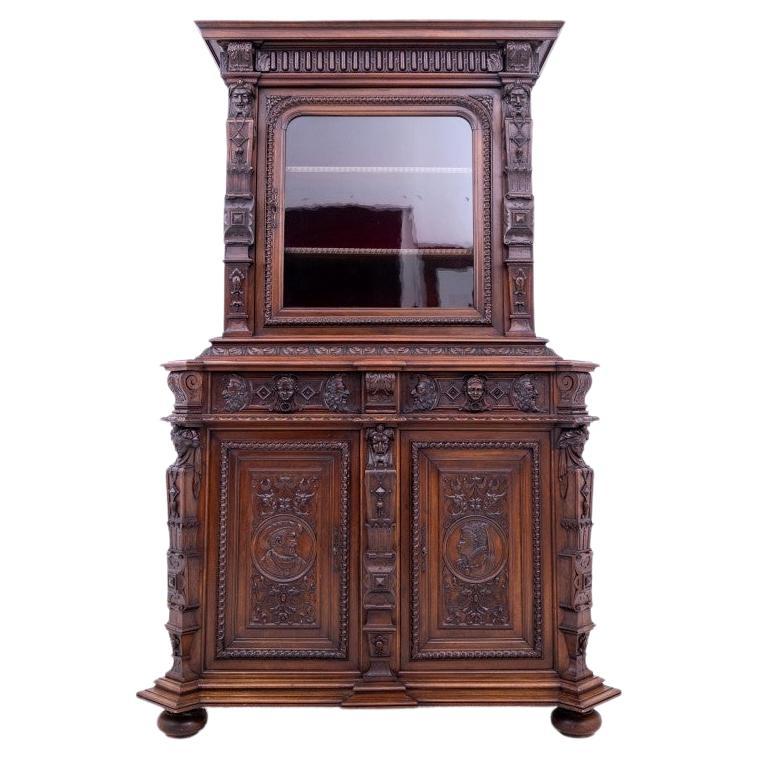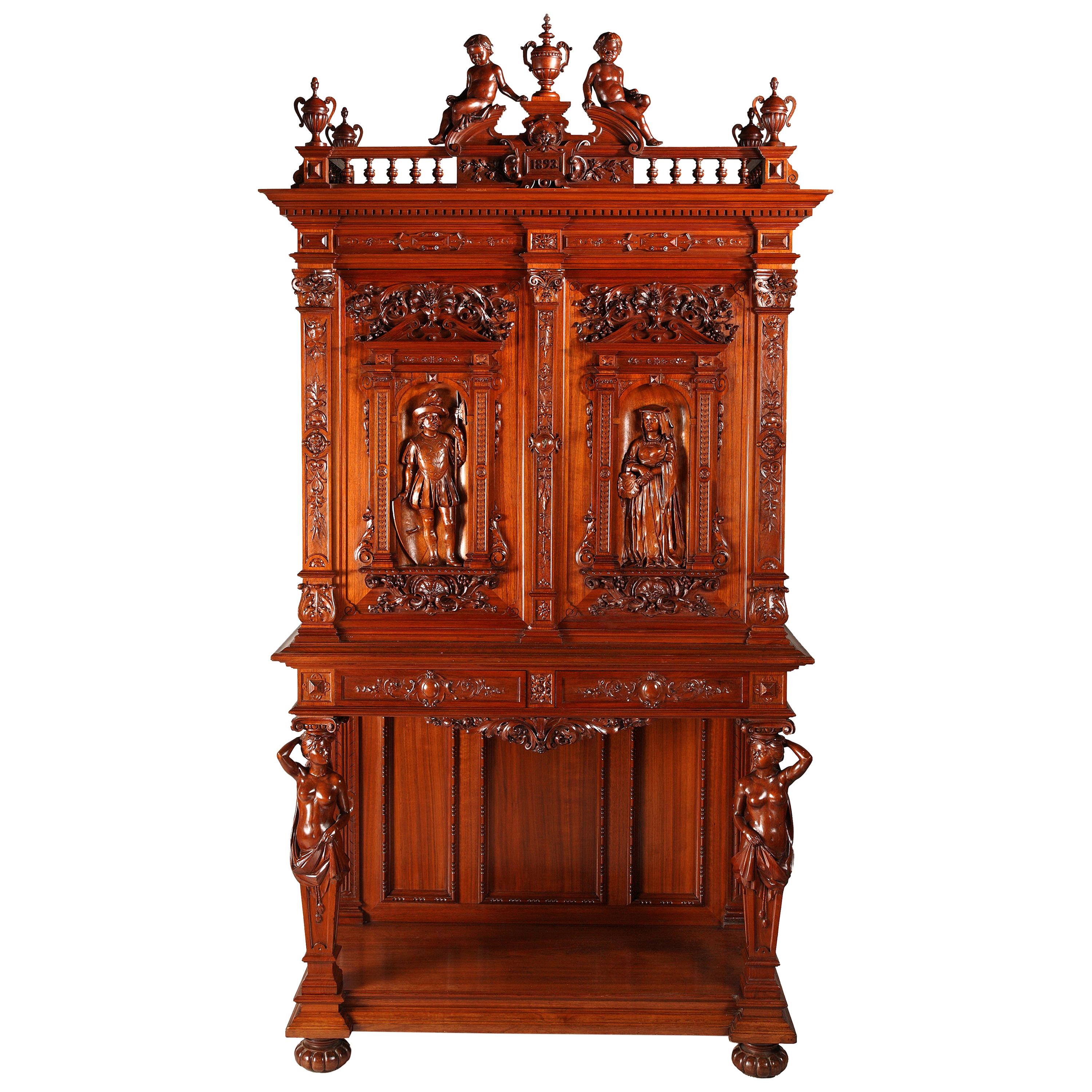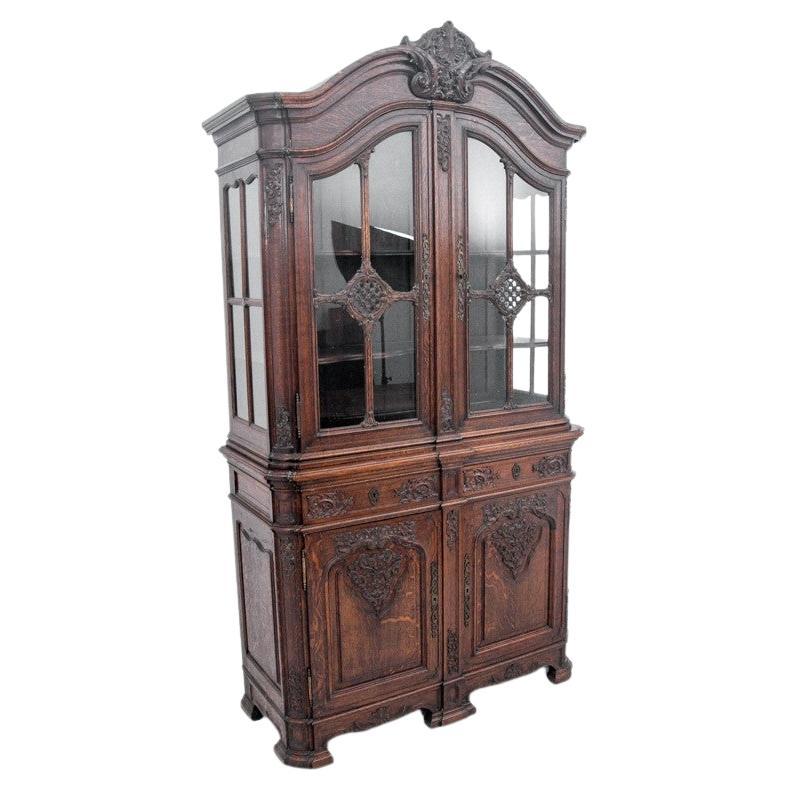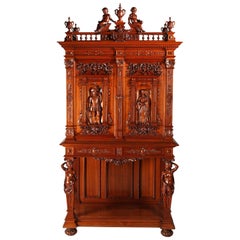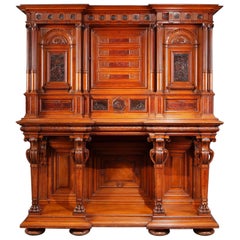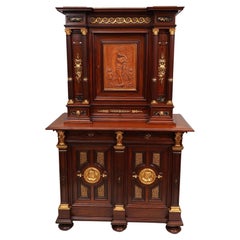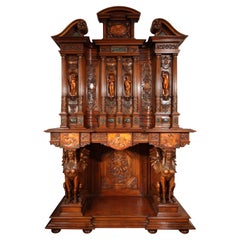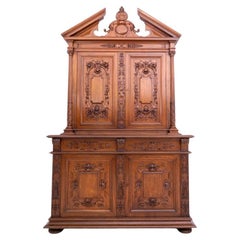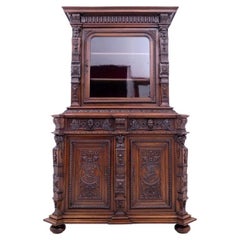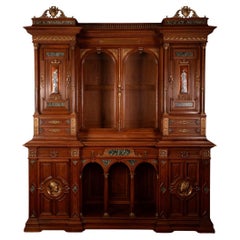Items Similar to Wooden & Enameled Display Sideboard Attributed to H.A Fourdinois, France, c1867
Want more images or videos?
Request additional images or videos from the seller
1 of 12
Wooden & Enameled Display Sideboard Attributed to H.A Fourdinois, France, c1867
$197,045.60per set
£147,235.82per set
€165,000per set
CA$271,794.85per set
A$297,742.80per set
CHF 156,720.22per set
MX$3,553,638.64per set
NOK 1,997,786.26per set
SEK 1,826,277.77per set
DKK 1,257,170.66per set
About the Item
Important two-tiered sideboard attributed to H.A. Fourdinois made in natural and carved wood : the lower part made up of four panels, two concave ones and two doors, richly ornated with a polychrome enameled floral decoration and gilt bronze plaques.
A large dual drawer is surmounted by the upper part of the sideboard, opening with two glazed doors, framed by detached columns. The entire unit is topped with a pediment onto which a female bust is carved in relief within a medallion on a gilt background.
With a matching set of twelve chairs.
The Forney library in Paris preserves order registers of the Fourdinois as well as sketches books and pictures representing pieces of furniture made by the Fourdinois workshops. In this documentation, some elements enable us to link this sideboard with Henri-Auguste Fourdinois’ productions, such as the large scrolls linking the upper part to the lower part of the sideboard, as well as the detached columns carved at their lower third. (picture n°1 attached)
Notebook containing ink-sketches coming from the Fourdinois workshop shows a project for a pelmet, beautified with a centering trophy composed of a torch and a quiver within in a foliage wreath, this motif obviously reused by the Fourdinois on the central decoration of the panels of our sideboard. (picture n°2 attached)
The firm of Fourdinois, considered during the Second Empire as the greatest furniture manufacturer in Paris, was founded in 1835 by Alexandre-Georges Fourdinois (1799-1871). It was developped in the context of the Expositions Universelles. At the time, the firm already produces furniture of the Neo-Renaissance style, such as a dresser that won the Great Medal at the London Universal Exhibition of 1851. The son, Henri-Auguste Fourdinois (1830-1907), joined the firm in 1860 and will become head of the firm in 1867. The high quality of his designs was remarked at the Universal Exhibition in 1862, when the jury awarded him two medals « for Excellence of Composition and Execution ». Henri-Auguste, now sole in charge, brought the firm to the summit of its achievements at the 1867 Universal Exhibition in Paris by winning the Grand Prize for his stand. Apart from the commissions he executed for the « Mobilier de la Couronne », he also produced high quality furniture for the Parisian bourgeoisie. The firm is at its zenith during the years 1862-1880. At this time, it is considered as an example to follow for other cabinet-makers, whether they are French, British or American.
Through the quality of execution and the extreme care taken in the decoration of furniture, H.-A. Fourdinois was particularly appreciated by Napoleon III and Eugenie, who ordered him to furnish several imperial residences, such with the bedroom of the apartment of the Pope at Fontainebleau Palace. Among his talents, Fourdinois knew how to match furniture with elaborate and luxurious sets, thus causing him to become one of the preferred suppliers of the Empress Eugenie. His meticulous work was in particular made thanks to the new technique of “en plein” marquetry, a decorative technique invented by H.-A. Fourdinois himself, for which he registered a patent allowing him to have the monopoly to use this technique. This new technique is quite different from the traditional marquetry which put together wood sheets veneered on a furniture piece. In Fourdinois’ “en plein” marquetry, the inlaid wood is joined together with the wooden structure of the furniture piece, allowing the cabinet-maker to carve directly the inlaid wood. Such a technique enabled to inlay different types of wood inside the structure as well as precious stones, ivory, slate, etc.
- Attributed to:Henri-Auguste Fourdinois (Cabinetmaker)
- Dimensions:Height: 130.71 in (332 cm)Width: 78.75 in (200 cm)Depth: 21.26 in (54 cm)
- Sold As:Set of 13
- Style:Renaissance (In the Style Of)
- Materials and Techniques:
- Place of Origin:
- Period:
- Date of Manufacture:circa 1867
- Condition:Wear consistent with age and use.
- Seller Location:PARIS, FR
- Reference Number:Seller: 2281stDibs: LU3860321426092
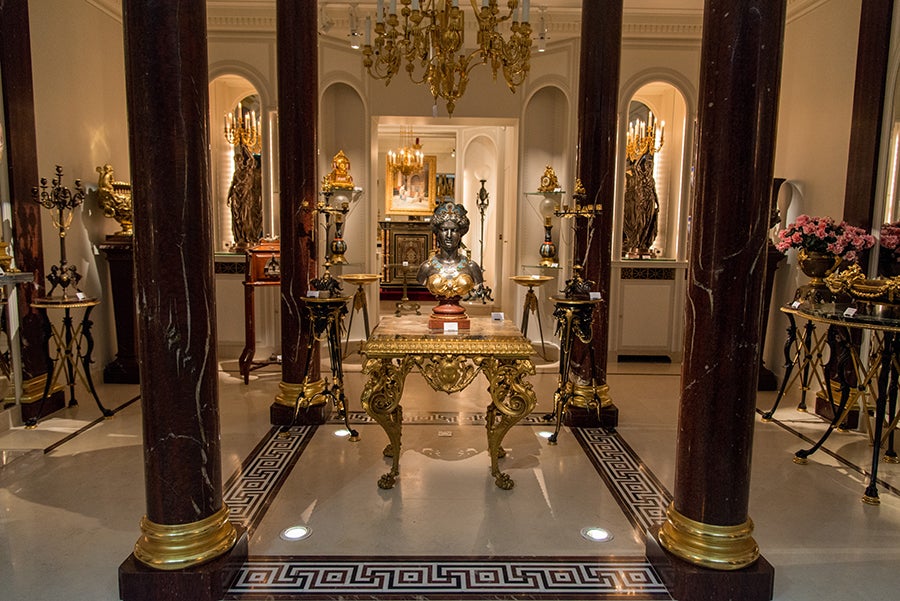
About the Seller
4.9
Gold Seller
Premium sellers maintaining a 4.3+ rating and 24-hour response times
Established in 1997
1stDibs seller since 2018
91 sales on 1stDibs
Typical response time: 2 hours
Associations
International Confederation of Art and Antique Dealers' Associations
- ShippingRetrieving quote...Shipping from: Saint Ouen, France
- Return Policy
More From This Seller
View AllRenaissance Style Wooden Cabinet Attributed to H.A. Fourdinois, France, 1893
Located in PARIS, FR
A wooden cupboard, elaborately carved throughout, dated "1893" on the crest and attributed to H.A. Fourdinois. The upper section with a pair of cherubs at the center of a balustrade ornamented with two-handled urns, two architectonic doors below, carved with lady and gentleman in niches surrounded by extensive carving with classical motifs. The lower section with two drawers above a standing female caryatid support at each front corner. The all reposing on four gadronned round feet.
The Fourdinois company was founded in 1835 by Alexandre-Georges Fourdinois (1799-1871). The Universal Exhibition held in London in 1851 was undoubtedly their first great artistic and public success. Winning the Great medal for a neo-Renaissance buffet...
Category
Antique 1890s French Renaissance Cabinets
Materials
Wood
$16,121 Sale Price
38% Off
Neo-Renaissance Cabinet by G.F. Quignon, Universal Exhibition of Paris 1889
By Frederic Gustave Quignon
Located in PARIS, FR
Presented at the Universal Exhibition of Paris in 1889
Important sculpted and engraved natural wood, patinated bronze and Griotte de Campan red marble inlaid Neo-Renaissance style cabinet.
The upper part is composed of a frieze of bronze medallions separated by triglyphs and supported by ribbed columns with Corinthian capitals. There are eight of these columns paired at the front and two simple columns at the rear. The facade presents an alternation of bronzes in niches and cartouches, of marble slates in cartouches sometimes flanked by palmettes, and of engraved motives of laurel and foliage scrolls. The upper part opens with three leaves and three mobile compartments. The belt carved with acanthus leaves opens with two drawers. This cabinet is supported by four richly sculpted tapered feet ending with claws. Four fluted pilasters are inscribed in the moulded back as counterparts. The whole ensemble stands on a moulded plinth and eight rounded feet.
Neo Renaissance Cabinet...
Category
Antique 1880s French Renaissance Cabinets
Materials
Marble, Bronze
$101,508 Sale Price
37% Off
Neo-Renaissance Cabinet by P. Sormani and attr. to E. Lièvre, France, Circa 1870
By Paul Sormani, Edouard Lievre
Located in PARIS, FR
Signed twice on the lock P. SORMANI 10 rue Charlot Paris
Rare neo-Renaissance cabinet in carved wood and Portor marble, adorned with chiseled and gilded bronze.
The upper, part, surmounted by a frieze of posts and marble cabochons, consists of a central door decorated with a carved panel representing the birth of Venus, framed by two pairs of ringed and fluted columns with Corinthians capitals in gilded bronze revealing two doors with secret opening. Two drawers with lion’s head shaped handles and a central drawer decorated with tracery in gilded bronze complete the upper part of this cabinet.
In the lower part, two drawers on the belt with diamond...
Category
Antique 1870s French Renaissance Cabinets
Materials
Marble, Bronze
$57,800 Sale Price
44% Off
Renaissance Style "Four Seasons" Cabinet by M. Lerolle, France, Circa 1890
By Lerolle
Located in PARIS, FR
Signed " Meubles D’Art, M. Lerolle, Fabricant, 61, Rue des Sts-Peres. Paris "
Remarkable carved wood cabinet, richly sculpted in the Neo-Renaissance style, and inlaid with vert de m...
Category
Antique 1890s French Renaissance Revival Cabinets
Materials
Marble
Regence Style Wooden Display-Cabinet by C. Potheau, France, circa 1895
By Potheau
Located in PARIS, FR
Signed Constantin Potheau, ébéniste, Paris.
Measures: Height 275 cm (108,2 in., width 160 cm (63 in.);
Upper part depth 48 cm (18.8 in.) / inside 42 cm (16.5 in.)
Lower part dept...
Category
Antique 1890s French Régence Buffets
Materials
Wood
Exceptionel Bookcase Forming Desk, by G. Grohé, France, Circa 1860
By Guillaume Grohe
Located in PARIS, FR
Exceptional neo Renaissance bookcase forming desk. This monumental piece consists in a lower part forming drop-front desk supported by two pillars with drawers. The lateral parts each open with a moulded door. The bookcase occupies the upper part, opening by four windows...
Category
Antique 1860s French Renaissance Bookcases
Materials
Wood
$812,066 Sale Price
20% Off
You May Also Like
Majestic sideboard, France, ca. 1880.
Located in Chorzów, PL
Majestic sideboard, France, ca. 1880.
Very good condition.
Wood: walnut
Dimensions: height 295 cm width 183 cm depth 65 cm
Category
Antique Late 19th Century French Renaissance Cabinets
Materials
Glass, Walnut
Carved Sideboard, France, Around 1880
Located in Chorzów, PL
Carved sideboard, France, around 1880.
Wood: oak
Dimensions: height: 242 cm, width: 132 cm, depth: 54 cm.
Category
Antique 1880s French Renaissance Sideboards
Materials
Walnut
Carved sideboard, France, ca. 1880.
Located in Chorzów, PL
Carved sideboard, France, ca. 1880.
Very good condition.
Wood: walnut
Dimensions: height: 220 cm width: 140 cm depth: 62 cm
Category
Antique Late 19th Century French Renaissance Cabinets
Materials
Walnut, Glass
Édouard LIÈVRE, Paul SORMANI, Neo-Renaissance ceremonial sideboard and buffet
By Paul Sormani, Edouard Lievre
Located in SAINT-OUEN-SUR-SEINE, FR
Description
Designed by Édouard Lièvre, this sideboard and serving trolley represent a masterpiece of the neo-Renaissance style. Their rediscovery represents a major event in the fie...
Category
Antique 1870s French Renaissance Revival Buffets
Materials
Marble, Bronze
Sideboard, France, circa 1880.
Located in Chorzów, PL
Sideboard, France, circa 1880.
Very good condition.
wood: oak
dimensions: height: 244 cm, width: 133 cm, depth: 55 cm.
Category
Antique 1880s French Renaissance Sideboards
Materials
Oak, Glass
English 19th Century Carved Satinwood Cabinet
Located in London, GB
A magnificently carved display cabinet of exhibition quality.
The maker has chosen to use a richly grained satinwood and executed the carving with extraordinary fluency and precis...
Category
Antique Late 19th Century English Renaissance Revival Cabinets
Materials
Mirror, Satinwood
More Ways To Browse
Gilt Bronze Plaque
Carved 1 Piece Wood Chair
George Iii Dining Chair Chair
Paneled Sideboard
Display Cabinet Bronze
Gilt Display Cabinet
Bronze Display Case
Antique Floral Plaques
Second Empire Furniture
Antique Pelmet
Gilt And Bronze Sideboard
Two Tier Sideboard
Antique Marble Sideboard
Walnut Veneer Sideboard
Antique Dining Servers
Danish Oak Sideboard
Carved Italian Sideboard
Retro Furniture Scotland
